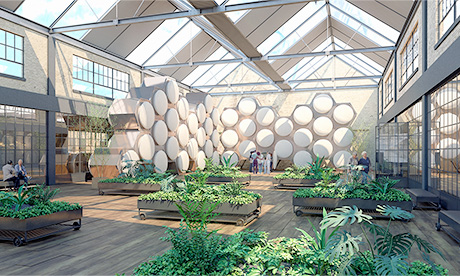Having one’s body composted after death and turned into about 1 cubic foot of soil could soon be an option for Washington state residents.
The approach, called recomposition, is currently being discussed by lawmakers and, if approved, could become a legal third option for after-death care by 2020.
“A lot of people might be reluctant to think or talk about death and might find the whole thing icky, but for the most part people are quite intrigued,” said Sen. Jamie Pedersen, a Democrat who is sponsoring the legislative bill.
He said the world has been re-shaped by innovation, and funerals should be no different.
In Washington state, dead bodies can either be cremated or buried, but Pedersen said both are damaging to the environment and expensive.
“Cremation takes a gigantic amount of energy … and with traditional burial they typically embalm the bodies by draining blood and adding chemicals,” he said. “There are environmental issues with both methods.”
Recomposition is a natural process that breaks down the body by placing it in a reusable vessel, covering it with wood chips and aerating it, which creates an environment for microbes and necessary bacteria.
The process takes about 30 days, according to Recompose, the Seattle-based company behind the idea.
The soil that is created from the body can either be given to the families or they can donate it to conservation land.
“Recomposition allows us to give back to the earth that supports us all our lives,” the company claims on its website.
Recompose plans to charge around $5,000 for its services.
The company recently co-sponsored a study, the Recomposition Science Project, at Washington State University and found that composting human bodies is environmentally sound. The study included examining and adapting techniques that have been developed for composting livestock.
“It is an understandable tendency to limit the amount of time we spend contemplating our after-death choices, but environmental realities are pressing us to develop alternatives to chemical embalming, carbon-generating cremation and the massive land use requirements of traditional cemeteries,” Recompose founder and CEO Katrina Spade said in a news release.
She added that, if every Washington state resident chose recomposition, it would save more than .5 million metric tons of CO2 within 10 years — enough to let 13 million seedlings grow into trees for 10 years.
According to the Center for Disease Control and Prevention, about 2.7 million people die annually in the U.S. More than half (53.5 percent) are cremated.
The National Funeral Directors Association, though, reports that more people are showing an interest in green burials.
Green burials, also called natural burials, minimize environmental impacts by not embalming, re-thinking burial containers and protecting the natural habitat with the goal of limiting waste and reducing the carbon footprint. Continue reading
